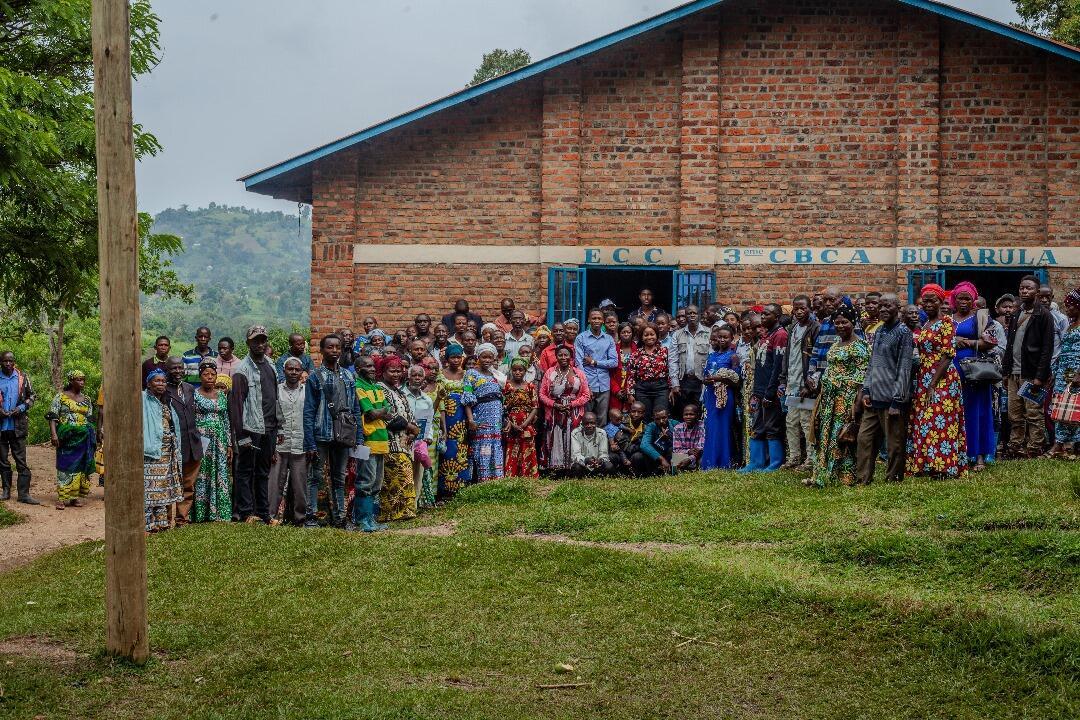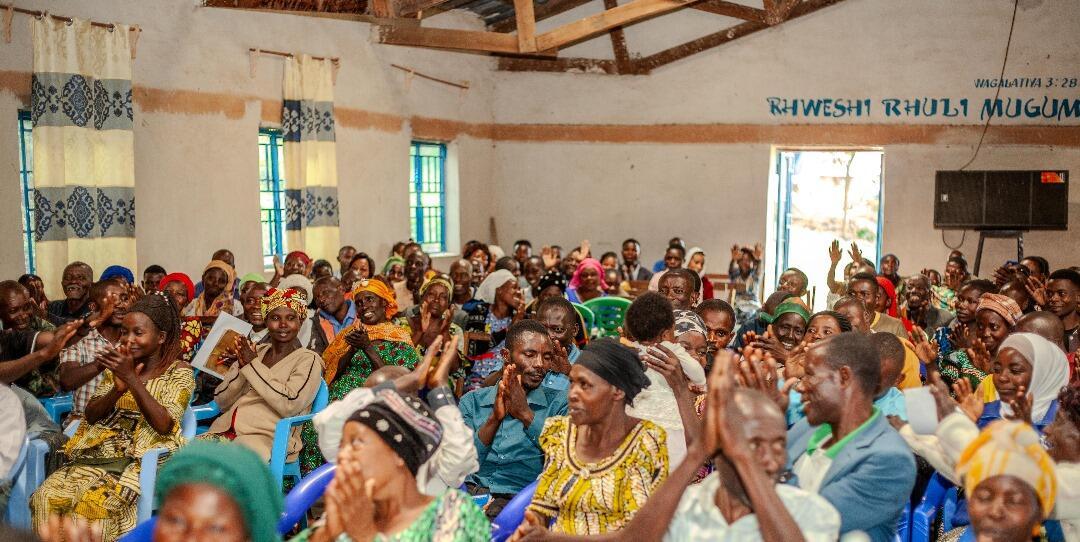By Bola Amoke Awotide, Jean Claude Rubyogo, Julie Ntamwinja, Lucky Kalisya, Amisi Nyengo Gilbert, Jean-Claude Cirhuza Makenda
Through training delivered in collaboration with partners—including ‘Union Pour L’emancipation de la Femme Autochtone’ (UEFA), ‘Initiative des Femmes Pour la Promotion de la Paix et le Developpment’ (IFPPD), and the ‘Beans for Women Empowerment’ (B4WE) project in Eastern DRC, funded by Global Affairs Canada— Furaha Matakumba, a farmer and mother of four, broke the cycle of inequality and violence that had long affected her household.
Her husband, Mr. Bikoto, a teacher and farmer, gradually changed his behavior: reducing alcohol consumption, taking on household responsibilities, and sharing income. The couple improved their crop productivity by adopting improved agricultural techniques and a joint budget, creating a more harmonious family environment. Their success demonstrates how social behavioral change communication (SBCC) and collaboration can transform deeply rooted patriarchal norms.
At dawn in the northern part of Idjwi Island, in South Kivu province, the melodies of birds blend with the gentle rhythm of Lake Kivu’s waves. Amid this tranquil setting, 28-year-old Furaha meticulously cultivates her beans, cassava, and maize fields. A mother of four, she is married to Mr. Bikoto Maombi, a primary school teacher and farmer. Yet, beneath the surface of their seemingly peaceful daily lives, deeply rooted patriarchal norms have cast a decade-long shadow of gender inequality over their marriage.
In many parts of the Democratic Republic of Congo (DRC), particularly in the eastern region, social structures and cultural traditions continue to marginalize women, limiting their rights and silencing their voices. Research indicates that although women shoulder a substantial share of agricultural and domestic responsibilities, they are often excluded from key decision-making processes. This exclusion not only perpetuates harmful practices and increases the risk of gender-based violence but also restricts girls’ access to education and deepens economic instability.
In Furaha’s household, a lack of communication and mutual support exemplified these challenges.
Although he was respected locally as an educator and hardworking farmer, Mr. Bikoto neglected family needs. Gradually, their relationship deteriorated into a toxic cycle of neglect and violence, both psychological and physical.
“Before the training, life at home was extremely challenging. My husband and I handled our finances separately, without discussing or collaborating. He never included me in financial decisions, and I was completely left out of important household matters.” — Furaha.
Furaha’s story reflects the reality faced by many rural Congolese women. Studies indicate that households where responsibilities and decision-making are shared experience improved well-being, better nutrition, and greater educational opportunities for children. However, fostering such changes demands a holistic, culturally sensitive approach that addresses gender inequality at its roots.
Stepping towards change
In response to these challenges, organizations and institutions have tried to advance gender equality and empower women by strengthening their agency, leadership, and decision-making abilities. In Eastern DRC, where ethnic diversity and ongoing conflicts intersect, various initiatives are working to reduce inequalities, expand educational opportunities and foster community-led development.
One such key initiative is the Beans for Women Empowerment (B4WE) project. Grounded in evidence-based approaches to transformative gender practices, the project empowers local communities with the tools and knowledge required to challenge deep-rooted norms. Through the active engagement of women and men alike, the project addresses economic, social, and cultural barriers that sustain gender inequality, thus fostering lasting change.
In rural areas like North Idjwi, reports of psychological, physical, and financial abuse are common. Deep-rooted in the notion that men should wield absolute authority, these abuses persist. B4WE’s training programs take a holistic approach: beyond raising awareness, they provide concrete tools for healthier communication, mutual support, and shared accountability within families.
A turning point
Furaha and her husband discovered the B4WE project when their marriage seemed doomed to a harmful cycle. They attended workshops on topics ranging from women’s involvement in decision-making, positive masculinity, and practical aspects of managing household budgets together.
Initially, Mr. Bikoto was reluctant. As an educated man, he questioned why he should change his lifestyle. However, through group discussions, role-playing exercises, and watching of videos about other men who had altered their behaviors, he began to reconsider his approach. The couple gained insights into the detrimental impact of alcohol abuse and Furaha’s exclusion from family decisions and the importance of joint planning.
“After the training, my husband changed his behavior. He drastically cut down on alcohol and began taking on some household chores. Now he carries our children, even when I’m not unwell, and joins me in the fields after school. He even created small vegetable gardens around our home to provide fresh produce for our family.” —Furaha
In addition to these shifts in household roles, the project introduced innovative agricultural techniques, including using biofortified bean varieties and proper spacing to enhance yields. Motivated by their strong team spirit, Mr. Bikoto adopted these methods, significantly increasing his harvest. Encouraged by this success, they took a transformative step by managing their income together for the first time.
This new financial management approach transformed Furaha’s opportunities, allowing her to start a small business at Sakiro market. The income from this business helps nourish and educate their children while strengthening household stability. Literature indicates that the benefits extend to the entire household when women gain economic agency.
A new beginning
Bolstered by their achievements, Mr. Bikoto took a significant step: for the first time in ten years of marriage, he accompanied Furaha on a visit to her family. More than a mere visit, this trip symbolized his renewed respect for her. He also committed to formally presenting a dowry, an act that underscores Furaha’s importance within their extended family network.
“Today, we are a happy, exemplary couple. My love for my husband has grown, and I am proud of him. Thanks to the B4WE project, we make decisions together and enjoy a harmonious home.” — Furaha
Their story demonstrates the power of education and collective support in unraveling deeply rooted inequalities. Although obstacles remain—such as resistance to change, funding shortages, and ongoing security issues—the B4WE project’s approach shows how local norms can be leveraged for sustainable transformation. Involving men as allies in the pursuit of equality is key, and real change is possible as individuals become aware of their role.
In many communities, a shift within a single household can inspire broader conversations: neighbors might ask about new farming techniques or a husband’s increased involvement in household tasks, sparking discussions about more equitable partnership models. Once community leaders witness the positive impact, they can become advocates for change, promoting and spreading best practices.
Ultimately, Furaha’s journey illustrates the transformative potential of targeted interventions to dismantle harmful gender norms. Through education, shared decision-making and respect, it is possible to break free from the silence that has long burdened women. While there is still much work to be done—in the DRC and globally—stories like hers remind us that each step taken in partnership can pave the way for a more equitable world.
By investing in socially transformative and development projects like B4WE, communities begin to challenge stagnant cultural assumptions, build mutual trust, and create a future where all voices are heard and valued. In the fields of Idjwi, what started as a conflict between two individuals has blossomed into an example of unity, respect, and shared purpose—proof that breaking barriers begins at home, one conversation and one action at a time.



